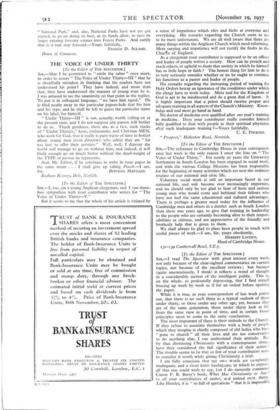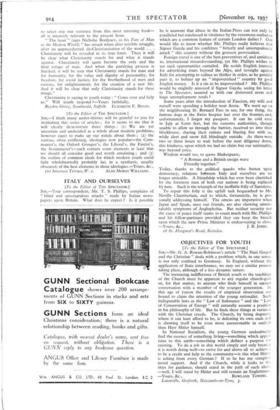[To the Editor of THE SPECTATOR.] Sut,—I read The Spectator
with great interest every week, not only because of the clear-sighted commentaries on current topics, nor because of the excellent reviews ; but because (quite unconsciously, I think) it reflects a trend of thought in a considerable section of the intelligent public. This is, on the whole, so profoundly depressing, that I find myself bracing up week by week as if for an ordeal before opening the paper.
While it is true, as your correspondent of last week points out, that there is no such thing as a typical outlook of those under thirty, or those under any other age, yet, because they are of the same generation, those under thirty look at life from the same view in point of time, and in certain broad principles seem to come to the same conclusions. The most important of these is their attitude to the Church.
If they refuse to associate themselves with a body of people which they imagine is chiefly composed of old ladies who have " gone to church " all their lives and are too conservative to do anything else, I can understand their attitude. But by thus dismissing Christianity with a contemptuous shrug. have they considered the full significance of their action ? The trouble seems. to be that so few of your contributors seem to consider it worth while giving Christianity a trial.
I am fully conscious that my own wards are completely inadequate, and a short letter inadequate, in which to express
all that one could wish to say, but I do earnestly commend Canon F. R. Barry's book, What Has Christianity to Say ? to all your contributors of under, and indeed over, thirtS- Like Hamlet, if is " so full of quotations " that it is impossible
to select any one sentence from this most arresting book— all is intensely relevant to the present hour.
" The hour " (says Nicholas Berdyaev, in his Fate of Man in the Modern World)" has struck when after terrible struggle, after an unprecedented de-Christianisation of the world . . . Christianity will be revealed in its true form. Then it will be clear" what Christianity stands for and what it stands against. Christianity will again become the only and the final refuge of man. And when the purifying process is finished, it will be seen that Christianity stands for man and for humanity, for the value and dignity of personality, for freedom, for social justice, for the brotherhood of men and nations, for enlightenment, for the creation of a new life. And it will be clear that only Christianity stands for these things."
Christianity is saying to youth today : " Come over and help us." Will youth respond ?—Yours faithfully,
Reydon Grove, Southwold, Suffolk. ELIZABETH E. BEVAN.

















































































































 Previous page
Previous page